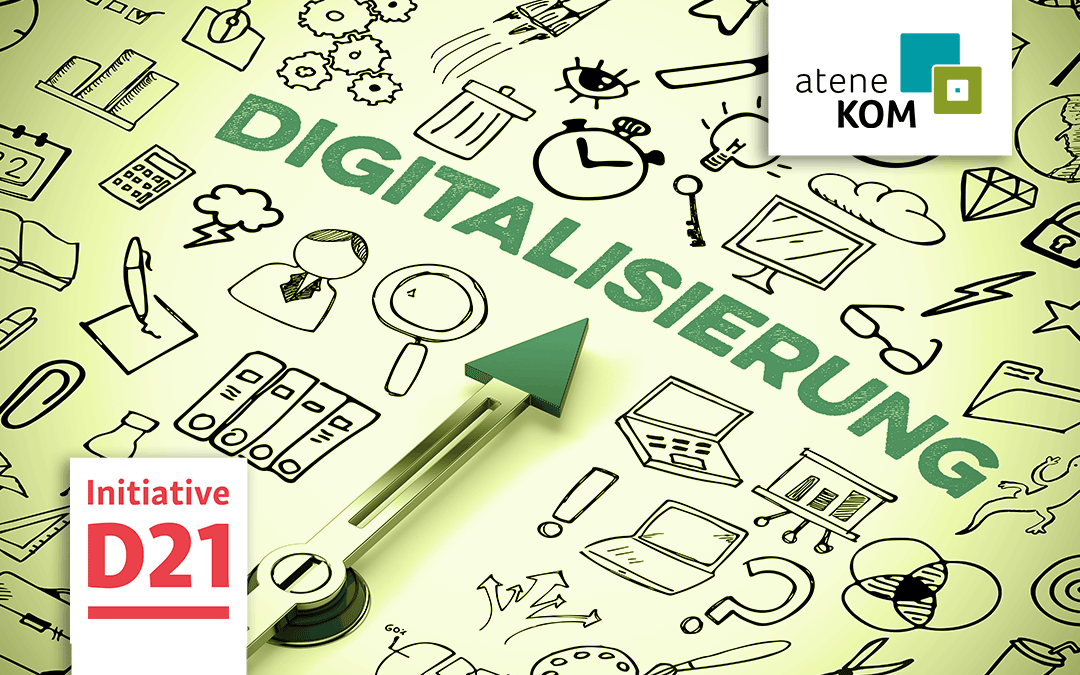Digitalisation in Germany is continuing its upward trend due to the increased use of digital applications. This is the conclusion of the D21 Digital Index 2020/2021, which has now been published in full by Initiative D21. The social study, which is supported by aconium GmbH as a premium partner, has once again recorded an increase in the Digital Index of German society.
The D21 initiative sees 2020 as a year of digital transformation and an accelerator of digitalisation in many areas of life and work, particularly due to the coronavirus pandemic: Companies, organisations and public authorities have continued to digitise, the proportion of employees working from home has doubled compared to 2019 and teaching in Germany’s schools has (largely) continued digitally. People’s everyday lives have shifted more into the digital space in the past year, meaning that the importance of digital skills continues to grow, and not just for professional life.
According to the authors, the renewed rise in the Digital Index is primarily due to increased internet usage and device equipment among respondents, meaning that more people gained access to digitalisation in 2020. At 88 percent, a large proportion of the German population is online and the proportion of mobile users in particular (80 percent) is growing faster than that of stationary users. In rural areas in particular (less than 20,000 inhabitants), mobile internet use has recorded the highest growth to 77 percent. Other factors for the positive development of the Digital Index are therefore a more diverse use of digital applications with increased usage time as well as more digital competence with regard to internet and smartphone applications.
This year, the representative study on the level of digitalisation in Germany focused on the areas of digital work, digital (school) teaching and digital health applications. As a premium partner of the D21 study, aconium already devoted itself to the topic of digital education in January in an exclusive special evaluation of the D21 Digital Index 2020/2021.
In its social study, the D21 initiative recommends evaluating previous experiences of digital teaching in order to be more resilient in the future. aconium Managing Director Tim Brauckmüller also underlines the desire on the part of parents and pupils to expand digital offerings: “The pandemic poses a particular challenge, especially for schools. It is now clear that digitalisation in education is indispensable. Of central importance, regardless of the technical equipment and learning content, is the broad will to do so. The results of the current D21 Digital Index show: This will is there. A large majority of teachers and an overwhelming 78 percent of all respondents are of the opinion that there must be mandatory further training for teachers at schools on the use of digital learning formats. An important prerequisite for digitalisation in education.”
The social study surveyed people from all age and income groups. Over half of the study participants (56 percent) are certain that they personally benefit from digitalisation. Despite the obvious heterogeneity of the digital society, it became clear that the proportion of citizens who are able to keep up with digital change and navigate it with confidence is increasing. Internet usage in the 14 to 59 age groups is at a very high level of over 90 percent. In the 60 to 69 age group, both overall internet use (85 percent) and mobile internet use (72 percent) increased.
In general, mobile internet use has risen among the study participants aged 40 and over – even among the over 70s to 36 percent. As part of a joint project under the auspices of Initiative D21, aconium GmbH conducted a study on the status of (digital) media education in German schools back in 2014 and derived corresponding recommendations for action for those involved in education policy.
Background:
Initiative D21 publishes an annual status report, the D21 Digital Index, to map the level of digitalisation in society. This study, which has been conducted since 2013, documents the digital transformation of German society and examines the level of digitalisation of the population on an empirical basis. It serves as a basis for decision-making for political, economic, civil society and scientific stakeholders. The index value is calculated using questions on the areas of access to digitalisation, user behaviour, digital literacy and openness to digital topics.
In the D21 initiative, the Education working group offers a neutral platform for exchange in order to advance digital education topics in Germany in a targeted manner. The network also conducts debates, exchanges experiences, breaks down potential barriers and imparts digital skills.
The network for the digital society – Initiative D21 for short – is an association of around 200 member companies and institutions as well as stakeholders from politics, administration, business and science. aconium GmbH is also a long-standing partner of the non-profit D21 association. You can download the complete D21 Digital Index 2020/2021 here:

